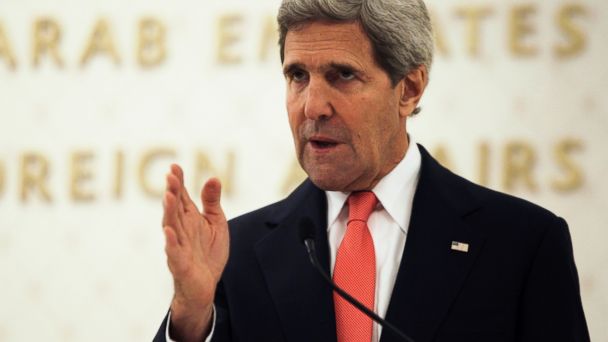John Kerry Declines to Elaborate on JFK Conspiracy Comments

Kamran Jebreili/AP Photo
After making headlines last week for wading into the never-ending John F. Kennedy assassination conspiracy theory debate, Secretary of State John Kerry attempted to put a lid on his comments over the weekend.
In an interview on NBC's "Meet the Press," host David Gregory asked Kerry to elaborate on comments he made to NBC's Tom Brokaw during a 50th anniversary special of Kennedy's death.
In the special, which aired last week, Kerry said that "to this day" he had "serious doubts that Lee Harvey Oswald acted alone."
Kerry added that he believed Oswald was "inspired somewhere by something."
"I'm not sure if anybody else was involved, I don't go down that road with respect to the grassy knoll theory and all of that," he continued. "But I have serious questions about whether they got to the bottom of Lee Harvey Oswald's time and influence from Cuba and Russia."
The Top 5 John F. Kennedy Assassination Conspiracy Theories
But by Sunday, Kerry was refusing to comment further when asked by Gregory.
"I just have a point of view. And I'm not going to get into that," Kerry said. "It's not something that I think needs to be commented on, and certainly not at this time."
Gregory, tacking the question on at the end of an interview that focused on Kerry's work with Iran's weapons program, pressed on and asked if Kerry believed the "conspiracy theories-[Oswald's] involvement with Russia, motivation from the Soviet Union or Cuba-are valid at some level?"
Kerry refused to budge.
"David, I'm not going to go into it. It's just inappropriate and I'm not going to do more than say that it's a point of view that I have," he said. "But it's not ripe or worthy or appropriate for me to comment further."
JFK conspiracy theories have become water cooler fodder again as the 50th anniversary of the president's assassination nears.
The Warren Commission concluded in 1964 Lee Harvey Oswald was the sole gunman responsible for killing Kennedy, but in 1978, a report of the House of Representatives Select Committee on Assassinations, argued that there likely was a second gunman who fired at the president.